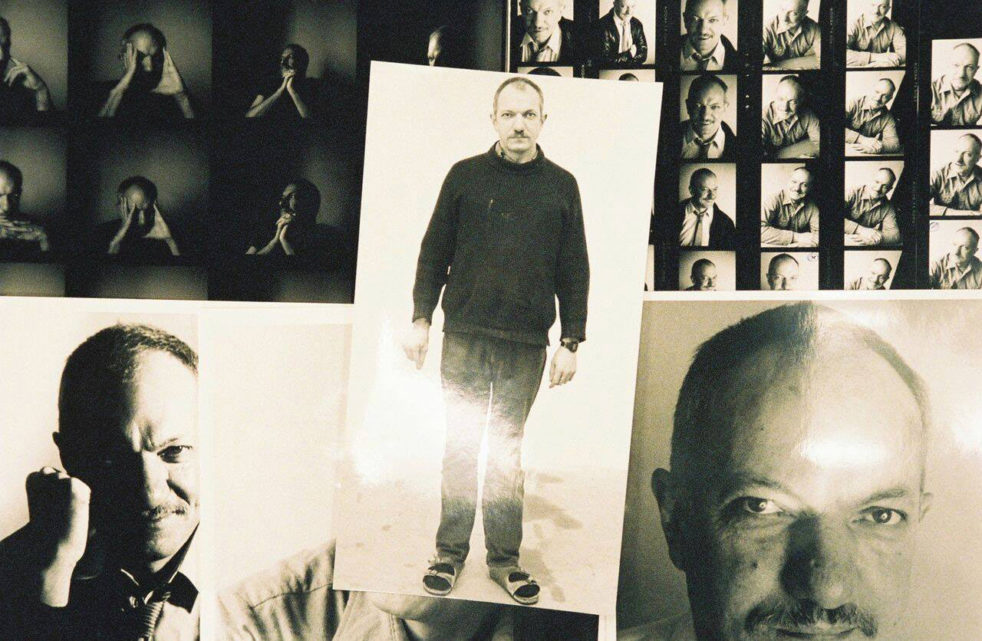MUSICA PRACTICA / ELETTRONICA VIVA
- Eugene Lew
- School of Arts & Sciences
-
Project Support Grant
Provosts Interdisciplinary Grant

Luke Fowler’s film Electro-Pythagorus: A Portrait of Martin Bartlett was screened at Lightbox Film Center in December 2018, as part of the Musica Practica / Elettronica Viva series. Electro-Pythagorus: A Portrait of Martin Bartlett pays tribute to the work and musical ideas of Martin Bartlett (1939-93), a proudly gay Canadian composer who pioneered the use of the ‘microcomputer’ in the 1970s and '80s. The screening was followed by a conversation with Luke Fowler and Anthony Elms, ICA’s Daniel and Brett Sundheim Chief Curator. Photo credit: Luke Fowler
Eugene Lew presented a series of electronic music performances, as well as ELECTRO-PYTHAGORAS, a film by Luke Fowler that presents an intimate and subjective portrait of the late Martin Bartlett: the Canadian electronic music pioneer, interdisciplinary composer, educator, and founding member of Western Front.
In spring 2019, as this project was coming to an end, Erin O’Malley (C ’21), Communications and Student Engagement Associate, interviewed Eugene Lew about MUSICA PRACTICA / ELETTRONICA VIVA. The following feature has been edited from that conversation.
“Almost everyone has been to some kind of EDM (Electronic Dance Music) thing,” Eugene Lew, recipient of a 2018 Provost Interdisciplinary Grant from The Sachs Program, says, “but very few [people] have been to a live electronic music performance.
Lew’s project, MUSICA PRACTICA / ELETTRONICA VIVA, a free, open-to-the-public series of concerts and conversations on electronic music performances and practices, seeks to change this, beginning with the students of his class, MUSC 275 Electronic Music.
I think of any music that’s recorded, processed, amplified, transmitted, or generated electronically as electronic music. A more common definition is limited to the latter…for Music 275, we focus on electronic modular systems as an open platform for creative exploration, collaboration, and listening.—Eugene Lew
Lew, who has worked in all kinds of music, has used the performances of this past year’s series to bring students into contact with artists whose work represents a diverse range of practices. He notes that it’s not always easy to get students to come to a performance, but by having his class visit the physical space of where a concert will be performed, see what’s involved with preparing for a performance, and experience a demonstration followed by a chance for conversations with the artist themselves, Lew curates a moment of learning that excites his students through the MUSICA PRACTICA / ELETTRONICA VIVA series.
“In electronic music,” Lew says, “the performer is also often the composer, and because of this, there is so much we can learn from this genre of music.” The MUSICA PRACTICA / ELETTRONICA VIVA series has allowed both those within the Penn community and those who are a part of the greater Philadelphia community to learn from and engage with electronic performances on a different level than just going to a concert. By prioritizing the discussion around music performances just as much as the performances themselves, audience members have the opportunity to not only listen to music but to think about it as well.
On the curation of the artists featured in the series, Lew looks to feature emerging artists who are pushing some kind of boundary, the kind of artists who share stories about their work and whose music encourages discussion. For Lew, there’s a significance to being able to build ongoing relationships with up-and-coming electronic music artists. “Almost all the artists are people I’ve had conversations with,” Lew says.
Although there usually isn’t a theme for each “season” of MUSICA PRACTICA / ELETTRONICA VIVA, the series is heavily shaped by coincidence and the vibrant arts scene of Philadelphia. Artists who have appeared in previous seasons of the series are usually local artists. Lew says that combination of his goal of giving a stage to what hasn’t been seen in past series’ performances and the luxury of not having to rely on ticket sales, a luxury provided by Lew’s grant from The Sachs Program, have enabled him to organize this series without typical commercial restraints, allowing this year’s lineup of performances to evolve organically.
On the biggest takeaway for his students Lew says, “It’s important to see what work is possible especially if you’re starting with electronic music, you’re at the beginning of your journey. I think of electronic music as an exercise in creativity and problem solving. You learn that there’s no one, singular way of doing things.”